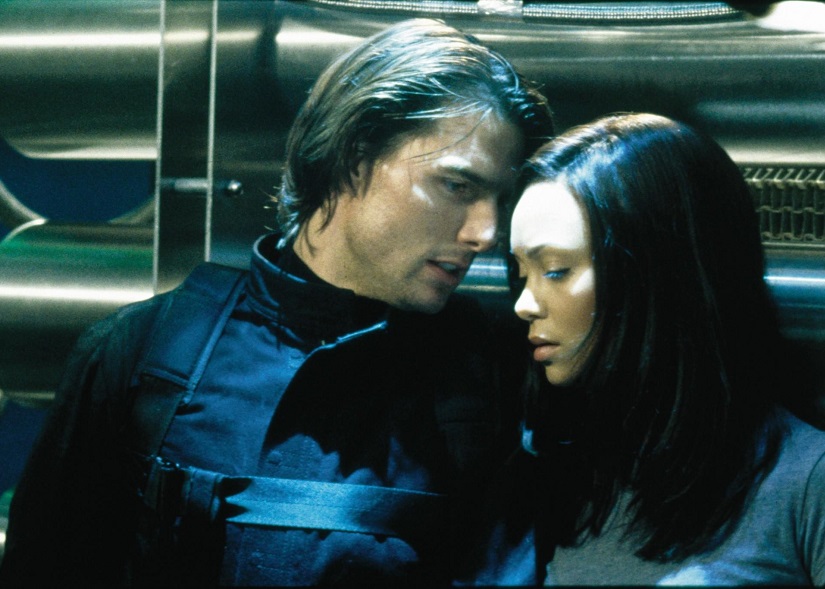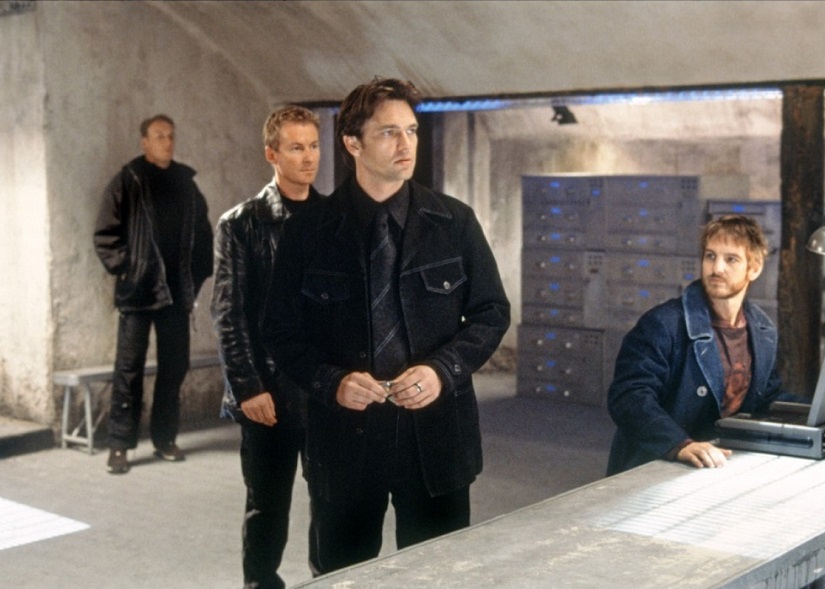While Brian De Palma’s Mission: Impossible was a financial and criticial success, questions about its hard-to-follow plot were seemingly taken to heart when producers Tom Cruise and Paula Wagner sought to redirect the sequel away from the original’s atmospheric blend of summer blockbuster and old-school action thriller and into more unashamedly spectacular action territory. The hot action director at the time was John Woo, coming off the back off a number of successful American ventures after establishing his name with the likes of The Killer and Hard Target in his native Hong Kong.
The kindest thing that can be said about Mission: Impossible 2 is that it’s sort of interesting for being a movie which bears virtually no resemblance at all, in plot, characters, tone or visuals, to its predecessor. Cruise’s character may be once again called Ethan Hunt, but to all intents and purposes, the protagonists of the two films manage to be completely different men despite both being largely blank slates in terms of personality. Woo’s melodramatic style, matching heightened action with ludicrously hammy symbolism and near-abusive quantities of slow motion, certainly has its lurid charms when expressed in full, self-mocking regalia – see the wonderfully barmy Face/Off – but is made instantly insufferable by being used as a misguided tool to enhance the cool factor of its star.
Every frame of Mission: Impossible 2 reeks of pandering to megastar Cruise’s ego. Woo’s camera is never shy of zooming in at just the right time to remind the audience of the actor’s toughness, rebelliousness, sensitivity, or just for one more look at that sexy, sexy Tomface. Having been more intellectual than fighter in the previous movie, Hunt grew his hair into an Aaron Carter mop in the interim and realised thinking was for dorks. After all, why strain the ol’ brain when the possibility exists to instead thump someone in the face with a flying kick, or engage in a little motorbike foreplay with the Scottish doppelganger with whom you share a girlfriend? To describe the movie as substance-free is an insult to things which don’t exist. It’s so monumentally vapid and self-involved that it makes existing things want to disappear until it’s all over.
The small moments of irony which do sneak through are among the movie’s most enjoyable, although that’s not saying much. It could be suggested that Woo was trying parody a certain kind of overwrought, star-driver blockbuster, but even if true, the few moments in which the satire registers are greatly outweighed by its extensive pandering to that same formula. Villain Sean Ambrose, played with all the toughness of a wet flannel by Dougray Scott, is supposed to be the anti-Ethan, but Ethan himself is such a non-entity that Ambrose himself just comes across as a preening, petulant pronk. His two moments of success both come in mocking Ethan, once describing how the hardest part of imitating him – more on that in a moment – was having to “grin incessantly for fifteen minutes” (more a jab at Cruise than Hunt) and later in contrasting his own ‘kill first, think later’ approach with Hunt’s eagerness to perform “some aerobatic insanity before [risking] a single hair on a guard’s head”. It’s worth noting that this is the first movie in which Hunt is shown performing anything like aerobatics, and while he was undeniably something of a pacifist in the first movie, here his approach is every bit as driven by guns and fists (steady) as Ambrose.
Leaving aside Scott’s flaccid performance, what little sense of danger Ambrose might have possessed is dissipated the moment he’s shown to be so blindly lovestruck by his ex-girlfriend, Nyah, that he willingly invites her into his lair despite it being such an obvious trap that he himself notes the contrivance of the whole scenario. The risk doesn’t matter, he explains to his bodyguard, Stamp (played by Richard Roxburgh), because he knows she’s a snitch and will get rid once he’s bored of having sex with her. If that doesn’t sound like an altogether honourable way of handling a female character, it’s as good as it gets for poor Thandie Newton. The first scene positions Nyah as a master thief, only for those skills (bar one instance of straightforward pickpocketing) to be consciously discarded in favour of making her the rope in a tug of war between hero and villain over who gets to have sex with her. Like many ‘strong female characters’, she does all the sassy posturing supposedly proving her an equal to the menfolk – although if that were true, she wouldn’t be required to prove it – only for the narrative to reduce her to a brainless plaything for Scott and Cruise, whose career-long inability to convincingly play romance is emphasized to a painful degree here with such clunking lines as “My God, you’re beautiful”. I do like her name though – Srta Nyah Nordoff-Hall – so that’s something.
Let’s also talk about the face masks, a fun little gimmick in the first movie but used incessantly here. The plot starts off with Ambrose ‘doubling’, needlessly, for Hunt, then continues in that vein throughout, with everyone seemingly having a mask of everyone else just in case it happens to come in handy. Yes, it’s supposed to emphasize Ambrose and Hunt being the same person on opposite ends of the moral compass – much like the pathogen and antidote making up the movie’s Macguffin and described by Dr. Nekhorvich, their Einstein-y creator, as villain and hero – but such symbolism doesn’t follow through when you have Hunt imitating Nekhorvich and Stamp as well. What’s that supposed to symbolise? Instead it functions as lazy shorthand to engineer some decidedly unshocking twists into a plot which could not be more rote if it tried: Ambrose wants to loose the Chimera virus on Sydney to increase the value of the shares he owns in the company manufacturing the antidote.
Sydney also makes a resoundingly dull location, having so little identity on-screen that the best settings the movie can muster up are a racetrack, a skyscraper and a bunker, with a remote sheep farm thrown in for good measure. The city dominates the movie’s running time, but there’s so little sign of any local history, unique architecture or culture that a very brief excursion through Seville offers infinitely more flavour in a tiny fraction of the time. It’s a hollow location for a thoroughly hollow movie, a stark contrast in every way to its complex, compelling predecessor. Action movies don’t need to be intelligent or even make a great deal of sense, but do need to offer something more than an excuse for the star to posture and prance about the place trying to remind everyone of what a badass he thinks he is, even when the embarrassing transparency of the act is immediately apparent to everyone forced to endure it.
It’s no surprise M:I II (yes, that’s the official abbreviation) marked the start of a downturn in Cruise’s career, to the extent that when the series’ second sequel was released a full six years later, his deteriorating public image was seen to have a negative impact on the movie’s marketing. Check back here for my coverage of that movie tomorrow.


